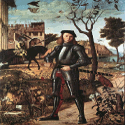|
Octy posted:Didn't the conspirators who assassinated Caligula want to restore the Republic? But as you said, no one would have remembered a system apart from the Principate. You'd have to go back to people's grandfathers, and even then they'd have only been kids by the time the Republic was well and truly finished (if my maths is in the least bit correct). I think that equation couldn't be made without the Praetorians.
|
|
|
|

|
| # ? Jun 13, 2024 05:58 |
|
JaucheCharly posted:I think that equation couldn't be made without the Praetorians. On that note, were there ever any Praetorian Prefects who established themselves as emperor? It seems interesting that even with the assassination of Caligula they clearly thought it important to have a 'legitimate' person in charge, rather than one from their own ranks. I understand later emperors avoided this by appointing their sons as Prefects, but I don't know how consistent a practice this was. It certainly didn't seem to stop the Guard from continuing to kill emperors until their final disestablishment in the fourth century. Octy fucked around with this message at 04:57 on Mar 24, 2014 |
|
|
|
Octy posted:On that note, were there ever any Praetorian Prefects who established themselves as emperor? It seems interesting that even with the assassination of Caligula they clearly thought it important to have a 'legitimate' person in charge, rather than one from their own ranks. I understand later emperors avoided this by appointing their sons as Prefects, but I don't know how consistent a practice this was. It certainly didn't seem to stop the Guard from continuing to kill emperors until their final disestablishment in the fourth century. Sejanus was the first great Praetorian prefect and came the closest to the top, but he still never broke that glass ceiling. He effectively ruled the empire for about five years, as he had effectively driven the emperor Tiberius into an early retirement in Campagnia. But no matter how hard he tried, Sejanus would never truly transcend his equestrian status - and when he attempted to marry into the royal line he was quickly shot down. For the most part, the Praetorian Guard was powerful but didn't have the strength they'd need to seriously offend Roman sensibility. Killing emperors and replacing them sure - one time they literally auctioned the job off to the highest bidder - but not poking at the class structure. And the emperors made sure that the guard never grew big enough to wield power by itself. There were a great number of so-called Barracks Emperors though, who were equestrians that gathered up troops from the provincial armies and did have large enough armies that they could essentially do as they pleased. http://thehistoryofrome.typepad.com/the_history_of_rome/2009/06/59-to-the-tiber-with-tiberius-the-history-of-rome.html http://en.wikipedia.org/wiki/Sejanus
|
|
|
|
So, I recently saw this and thought you'd like it: http://news.rice.edu/wp-content/uploads/2014/03/2014-03-14-AdamsonPaper.pdf
|
|
|
|
From a few months agoeuphronius posted:
|
|
|
|
When were the pro-consular powers given to Augustus? Wouldn't the senate have seen him as a threat to their power as they did Julius Ceasar? Also, overriding powers were usually temporary provisions, how did Augustus get around the usual time limits?
|
|
|
|
He gave up being the permanent Consul I think in 23 bce, and from then on just used proconsular, tribunate powers and censor powers to dominate everyone. So they got around the office term limits but just giving him the power of the office with out actually giving him the office. See? Brilliant.
|
|
|
|
I was pretty surprised to recently learn that not all Emperors were Consuls for life. I had always just assumed they were. Did they have the title Imperator for life, though?
|
|
|
|
Well, the title was Augustus. You usually had to be an imperator before you could be an Augustus though, for the times it was not inherited (most of the time.)
|
|
|
|
Ynglaur posted:I was pretty surprised to recently learn that not all Emperors were Consuls for life. I had always just assumed they were. Did they have the title Imperator for life, though? Imperator was a general honorific term for a military commander that did particularly well, rather than a formal rank, office, or title(typically, you had to be granted imperator to be entitled to hold a triumph). It didn't become a term exclusively associated with the men we call emperor now until after Tiberius' reign - Augustus for instance also had the title imperator granted to some family and friends during his reign.
|
|
|
|
Doesn't it actually mean something like 'commander', and is a very military sounding title? I seem to recall a comparison to the modern military dictator titles we see; things like Generalissimo, but slightly more dignified to the ears.
|
|
|
|
Oberleutnant posted:Doesn't it actually mean something like 'commander', and is a very military sounding title? I seem to recall a comparison to the modern military dictator titles we see; things like Generalissimo, but slightly more dignified to the ears. At first, imperator described a magistrate who had been granted the power of imperium - the "power to command" roughly in the sense of being a general commanding an army, though occasionally you could be an imperator that was commanding something thoroughly civilian. The Roman Kings also held imperium, but were not described as imperators since they were already king. Someone who was an imperator could be overriden by higher level imperators, or by peers of similar rank. Since you were given explicit military command power, including a reasonable amount of authority to conduct whatever military campaign it was on your own, you were a commander. Then, later on in the Republic period, it became a title that you would only grant to existing military officials who secured great victories - i guess at this point you could describe it as something like when during very major wars a very important general goes from "just" a 4 star general to a temporary 5 or 6 star rank to indicate they're very important and get a title like General of All The Armies. In this context, these military officials would get imperator title as part of being granted the right to hold a triumph in Rome. When it was first given to Caesar, Augustus, and the like, it was in the context of "this guy is a really great military commander". These terms get somewhat muddled, because by the end of the empire, "imperium" had become pretty much synomous with what we now call imperial power, as well as being synonymous with where an "emperor" might hold imperial power, and imperator itself is the direct source of the word emperor in English and similar words in other languages.
|
|
|
|
When a Republican Roman commander did something very impressive he would be hailed as imperator by the (surviving) troops, which probably boiled down to guys smacking swords against shields and yelling "Imperator!" over and over. Later on, this being hailed on the field became a prerequisite for being granted a triumph, and since the commander could control things like bonus pay for the troops, and commanders really, really liked triumphs, well. You get the idea. And then the Emperors sort of make it dangerous to be hailed as Imperator, since Imperator is the Emperor, and it wasn't a good idea to try and be a second emperor unless you were Vespasian. But it starts old Italian grass roots poo poo, like the corona graminea, which was uhhh. Also, grass roots poo poo, I guess.
|
|
|
|
physeter posted:
Nicely done. For those unfamiliar.
|
|
|
|
Was the Grass Crown never granted after Augustus? I.e. in Imperial times?
|
|
|
|
physeter posted:When a Republican Roman commander did something very impressive he would be hailed as imperator by the (surviving) troops, which probably boiled down to guys smacking swords against shields and yelling "Imperator!" over and over. Later on, this being hailed on the field became a prerequisite for being granted a triumph, and since the commander could control things like bonus pay for the troops, and commanders really, really liked triumphs, well. You get the idea. And then the Emperors sort of make it dangerous to be hailed as Imperator, since Imperator is the Emperor, and it wasn't a good idea to try and be a second emperor unless you were Vespasian. One of the conditions for a Triumph was being hailed Imperator by your troops.
|
|
|
|
Augustus changed his first name to Imperator. He went through a bunch of names during his life. All soldiers also took an oath of loyalty to him each year. Not the government, or county, or Senate and people. With that you don't need many other powers, and Augustus was good at making his powers as inoffensive as possible.
|
|
|
|
Would it be fair to say that Julius was determined to make people accept him as their one true leader, but Augustus was determined to make people WANT him as their one true leader?
|
|
|
|
Amyclas posted:When were the pro-consular powers given to Augustus? Wouldn't the senate have seen him as a threat to their power as they did Julius Ceasar? Also, overriding powers were usually temporary provisions, how did Augustus get around the usual time limits? After the civil wars few of the Senate were still alive. It was then re-filled with Octavian's supporters of course. People were also tired of decades of infighting and wars without gain, so there wasn't really any opposition to Octavian becoming king in all but name, because all the staunch Republicans were dead and Octavian was the only one still holding a big army with an outstanding general - Agrippa - at its head. It also helped that he decidedly worked the whole thing as a primus-inter-pares deal, without much formality, pomp or court etiquette that usually signify kings and tyrants (at least early on, and then nothing like his successors). Romans of course would have hated anything resembling such things so he made a show of being "one of the people". Also, don't forget Rome was mainly founded on agriculture and trade*. War disrupts both, peace allows it to flourish. Augustus made sure people (the one that mattered) got to accumulate wealth without disruption of war - at least inside Roman borders. *banditry and pirating actually, but add a few centuries and it becomes called merchant spirit and "taking the opportunity". Decius fucked around with this message at 08:55 on Mar 25, 2014 |
|
|
|
I got into it with someone again today. An argument of the type I've been fighting since the start of this thread. I just cannot believe that in the 600's AD a state that had 1. consuls 2. a senate 3. patricians 4. physical control over the city of Rome 5. an unbroken line of Emperors was not the Empire of Augustus but a separate state, a "Byzantine Empire". I thank GF for always being cool on this issue, of corse.
|
|
|
|
My ideal of teaching the Roman imperial state would be to think of Augustus-Constantine as the beginning, and Alexius I-Constantine XI as the end, with the Macedonians or the Heraclians in the middle.
|
|
|
|
Jerusalem posted:Would it be fair to say that Julius was determined to make people accept him as their one true leader, but Augustus was determined to make people WANT him as their one true leader? I'd say it was the other way around.
|
|
|
|
What kind of Naval Ensigns and signal flags did ancient navies use?
|
|
|
|
Decius posted:*banditry and pirating actually, but add a few centuries and it becomes called merchant spirit and "taking the opportunity". Care to give more details?
|
|
|
|
Decius posted:After the civil wars few of the Senate were still alive. It was then re-filled with Octavian's supporters of course. People were also tired of decades of infighting and wars without gain, so there wasn't really any opposition to Octavian becoming king in all but name, because all the staunch Republicans were dead and Octavian was the only one still holding a big army with an outstanding general - Agrippa - at its head. Someone earlier this thread described the origins of Rome as essentially a bandit camp (and I'd imagine many other places started in a similar way), is there any research out there substantiating that?
|
|
|
|
Phobophilia posted:Someone earlier this thread described the origins of Rome as essentially a bandit camp (and I'd imagine many other places started in a similar way), is there any research out there substantiating that? Total nonsense. The literal truth is that Romulus and Remus founded the city of Rome. Don't you dare suggest they were no more than common thieves. It is an interesting theory. I've never heard of it before, though. The trouble is there's comparatively little evidence from the foundation of Rome or really its first few centuries of existence. I don't know that you could prove it in any way.
|
|
|
|
It provides an interesting, if unprovable explanation, for why the legendary founders of Rome had no women and had to go to the Sabines for brides.
|
|
|
|
|
Phobophilia posted:Someone earlier this thread described the origins of Rome as essentially a bandit camp (and I'd imagine many other places started in a similar way), is there any research out there substantiating that? Octy posted:Total nonsense. The literal truth is that Romulus and Remus founded the city of Rome. Don't you dare suggest they were no more than common thieves. The Capitoline Museum in Rome has some dioramas of the area from before the city. As I recall, there is mention of a temporary settlement and of the location of the city being at the crossroads of a couple of trade routes. This is before the actual founding of the city, however. I am not sure how up-to-date that information is.
|
|
|
|
The bandits thing is part of Rome's self-told legendary founding. They started building a city and needed people so they took in anybody they could get, including bandits and pirates and any other unsavory types that didn't have a home. Like Azathoth said this led to a huge gender unbalance which led to them having to go kidnap (this is the 'rape' that the 'rape of the Sabine' refers to; forcibly marrying women was pretty much par for the course at the time) a bunch of of women. Whether or not it happened I don't think we know. Like a lot of legends it probably reveals more about the mindset of the Romans who came up with the legends than historical fact.
|
|
|
|
Some people have been inclined to take the story more literally because they figure why would people claim to have started as a bunch of outlaws if they hadn't been? I suspect the legend is more about establishing why Rome's society was more inclusive than others.
|
|
|
|
According to legend the sabine women eventually didn't want to go back and forced their husbands and birth families to make peace.
|
|
|
|
For anyone interested, the adaptation Rape of the Sabines is an educational film appropriate to all ages. https://www.youtube.com/watch?v=E7FKcUOi3-8
|
|
|
|
Grand Fromage posted:Some people have been inclined to take the story more literally because they figure why would people claim to have started as a bunch of outlaws if they hadn't been? Captain Postal fucked around with this message at 10:52 on Mar 26, 2014 |
|
|
|
Captain Postal posted:
I don't know about that. The Romans had a lot of trouble with pirates up until the late Republic. I'm not sure the average Roman would have been looked upon that well if he claimed descendancy or any kind of relationship with pirates.
|
|
|
|
Octy posted:For anyone interested, the adaptation Rape of the Sabines is an educational film appropriate to all ages. https://www.youtube.com/watch?v=E7FKcUOi3-8 I prefer this one. https://www.youtube.com/watch?v=T9wbse4HHII&t=32s
|
|
|
|
So, what's everyone's favorite ancient cult? I just learned about a second-century Syrian goddess cult that sounded pretty intense. Worship of Atargatis persisted into at least the third century, and itinerant priests visited large Roman cities with images of her affixed to their donkeys. Sadly, its cultic site was in an area now held by the Islamic State of Iraq and al Sham, which despite its initials (ISIS) is pretty much as anti-goddess as you can get.
MothraAttack fucked around with this message at 08:36 on Mar 30, 2014 |
|
|
|
Cybele or Isis.
|
|
|
|
The only cult that matters. The Imperial cult.
|
|
|
|
Cult of Mithras owns. Probably invented the modern handshake.
|
|
|
|

|
| # ? Jun 13, 2024 05:58 |
|
Ancient Carthaginian Baal worship. 420 sacrifice children erry day 420 
|
|
|




























